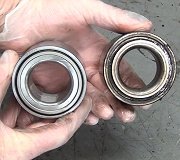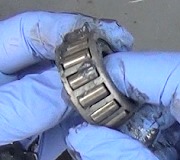Your symptom description is going in a number of different directions, but I can provide some generalizations. First of all, when wheel bearings become noisy, they sound like the buzz of an airplane engine. With some designs the noise will become very quiet when you turn toward the noisy one, as in changing lanes. Turning toward it momentarily removes some of the weight from it. Performing a brake job will not cause a bearing to become noisy. I suspect the noise they were telling you to expect was typical brake pad noise. The problem is it's the higher quality linings that usually squeal in humid weather and when they're still cold. Cheaper lining material is quieter but it wears out faster. That has nothing to do with the car brand. Regardless of the quality or material of the linings, they have to have the exact same "coefficient if friction" as the original linings to maintain the carefully-designed-in front-to-rear braking balance. Some cheaper lining material is more aggressive, meaning it has higher friction, so they'll be physically smaller to compensate.
You're also talking about bad tire wear. That is an alignment issue. There are three things that tell you if the alignment is off. The most obvious is when the steering wheel is not straight when you're driving straight. Most things that cause the steering wheel to be off-center will also cause the car to pull to one side when you let go of the steering wheel. You notice those two things right away. The third thing is tire wear. That takes time to show up, and nine months is more than enough time. It's actually the miles, not the time, that causes the wear patterns. Anyone at a tire and alignment shop can "read" the wear patterns to give you an idea of what is wrong with the alignment. They will also inspect the steering and suspension systems for worn parts
A rattle, squeak, or clunk when driving over bumps is not a noisy wheel bearing. That is a loose or worn part in the steering or suspension systems and very often is leading to a safety issue. If a ball joint or tie rod end separates, it's anyone's guess which way the car will skid to a stop. It is rare, but it is possible for that type of noise to occur right after the brake job. It's not a result of the brake job. It's due to the suspension hanging down while the car is up on a hoist. The "unloaded" suspension can let a part shift a little and make the noise show up. It's important to understand the part was worn already; it just wasn't making noise yet. The bottom line is noises like that must never be ignored. Ball joints hold the wheel in alignment, and tie rod ends are involved with the direction the wheel is steering. Either of those can cause a clunking noise, and both will cause bad tire wear if they're sloppy.
Friday, August 26th, 2016 AT 10:15 AM



